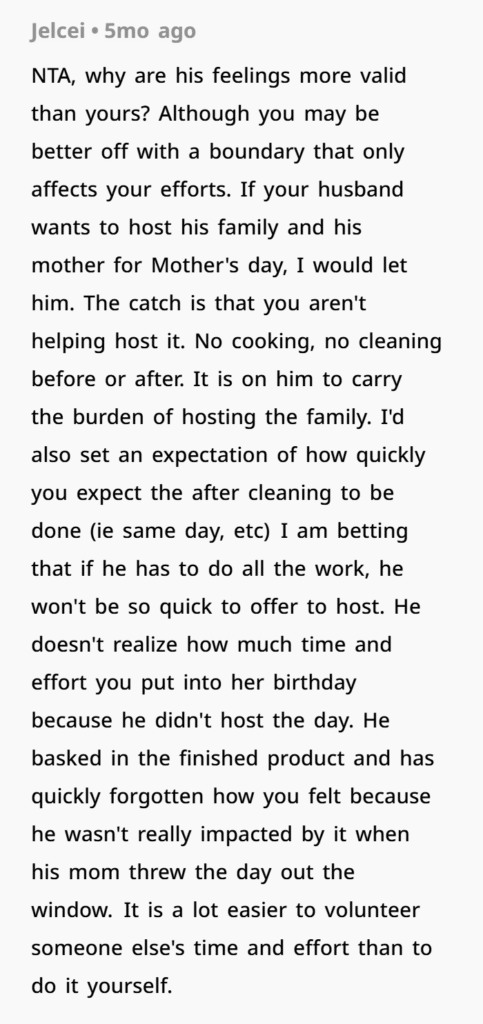Mother-in-Law Skips Birthday Party, Daughter-in-Law Says ‘Never Again’ – No More Celebrations at Their Home
In this AITA post, a 27-year-old woman draws a firm line after years of tension with her mother-in-law. Despite loving to host and enjoying time with her husband’s large family, she decides not to celebrate Mother’s Day at her house anymore—specifically due to her MIL’s passive-aggressive behavior and a recent no-show at her own birthday party.
It all started when her husband sent a group text inviting everyone to celebrate his mom’s birthday. One sister-in-law (SIL) claimed she wasn’t “formally invited” even though she was in the group chat. MIL took her side and refused to attend the birthday gathering as a form of protest. The OP (original poster) did all the work for the event, only to be met with silence and no acknowledgment from MIL. That night, heartbroken, she calmly told her husband they would no longer be hosting any celebrations involving his mom. A few months later, he casually asked if they should host Mother’s Day. That lit a fuse.
OP stood her ground. She reiterated that her new boundary was final: no more hosting, cooking, or party-planning for someone who can’t show up or show respect. Her husband agreed, but called her petty. So now she’s asking Reddit: AITA for saying no more Mother’s Day hosting, ever?
In-law drama is one of those universal struggles that couples eventually face

The author’s husband invited family via group chat for his mother’s birthday, but his sister claimed she wasn’t “formally invited” and his mother sided with her












Let’s be real—this story isn’t just about whether or not the OP should host Mother’s Day. It’s about emotional labor, family loyalty, gaslighting, and how setting boundaries with toxic in-laws can shake even the strongest relationships. So let’s unpack what’s really going on here—and why OP’s reaction might not just be reasonable, but healthy.
📌 Emotional Labor and The Hidden Toll
First off, emotional labor is the invisible, unpaid work people (especially women) do to keep relationships and households running smoothly. It’s the mental checklist of who likes what dish, remembering birthdays, managing feelings, smoothing over drama, and keeping peace.
In this case, OP isn’t just hosting. She’s planning, prepping, cooking, cleaning—and doing so in a house where there’s tension with her MIL. She’s pouring in hours of physical and mental effort for someone who doesn’t even have the decency to show up or say thank you. That’s not just inconsiderate—it’s disrespectful.

According to Dr. Jennifer Freed, a licensed psychotherapist, “When your contributions are taken for granted or met with contempt, the emotional cost can quickly outweigh any joy that once came from the act.”1 OP’s decision to draw a boundary isn’t petty—it’s protective.
🧠 The Psychology of Boundaries
A lot of people struggle with the idea of setting and maintaining boundaries, especially in families where guilt and loyalty are used as weapons. But boundaries aren’t punishments—they’re shields.
Clinical psychologist Dr. Ramani Durvasula says, “Boundaries are not about keeping people out; they’re about protecting your mental health.”2 In this case, OP is saying: “I’m not okay being disrespected and still expected to show up 110%.” That’s fair.
She even clarifies: she’s fine with attending future events or contributing minimally. She’s not cutting MIL off; she’s just stepping back from being the one doing the heavy lifting. That’s a boundary rooted in fairness and emotional safety—not vengeance.
🔁 Forgiveness vs. Access
Now here’s where the husband’s comment hits wrong. He asks, “Have you forgiven her?” And when she says yes, he says, “That’s not how it works.” But here’s the thing: Forgiveness doesn’t equal access.
You can forgive someone and still decide they no longer get certain privileges. OP is not saying, “I hate your mom.” She’s saying, “I won’t host her in my home anymore because she doesn’t respect me.”
That’s not holding a grudge. That’s holding her ground.
Think of it like this: if someone spills coffee on your white couch and never apologizes, sure, you can forgive them. But maybe next time, they don’t get to bring coffee into your house. Actions have consequences—even in families.
🔍 Related Reddit Stories & Real Cases
This story echoes so many posts in r/JUSTNOMIL and r/relationships where spouses struggle to navigate disrespectful in-laws. In one popular thread, a woman refused to host her MIL after she made racist comments at dinner. Her husband called her “dramatic,” but Reddit had her back, with over 20k upvotes saying boundaries are healthy—even if they make others uncomfortable.

Similarly, in family counseling, it’s often noted that unresolved tension with in-laws is one of the top five reasons couples argue. According to the Gottman Institute, “when one partner doesn’t feel emotionally supported in family conflicts, it can lead to long-term resentment.”3 Sound familiar?
These terms aren’t just good for SEO—they reflect the exact pain points OP is dealing with. And thousands of people Google these every single day because they’re living through the same thing.
Netizens agreed that the author’s husband was minimizing her feelings while expecting her to carry the workload for his family






Let’s face it—this isn’t about hosting one party. This is about being seen, heard, and respected. OP’s MIL sent a very clear message by skipping the birthday party: “I’m loyal to the drama, not the effort.” And OP’s boundary is the reply that says: “Okay. Then I’m out.”
Is it permanent? Maybe. Maybe not. But right now, it’s necessary. And no, it’s not petty to stop setting the table for people who won’t sit at it with you.

